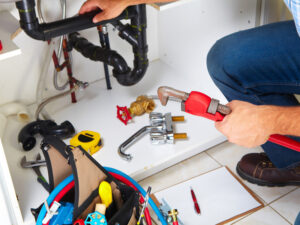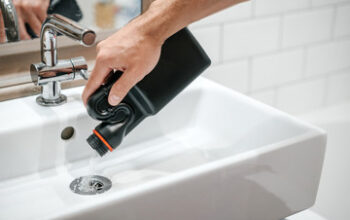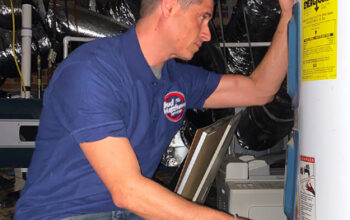A residential Plumber Tampa is a licensed professional who can help fix your plumbing problems. They know the plumbing regulations in your area and will ensure that their work is up to code, protecting you from any legal issues.
These professionals deal with pipes that carry water and gas throughout a building. They install, repair, and maintain the systems, allowing clean water supply and adequate drainage.
A residential plumber is someone who works on plumbing mechanisms in homes. They are responsible for the water and sewage systems in homes and all the fixtures and appliances in these structures. They work on new construction and renovation projects. They may also be asked to perform preemptive maintenance or troubleshoot issues in existing plumbing systems. The duties of a residential plumber include reading and interpreting blueprints to assess or plan plumbing installations. They are required to have excellent mechanical skills, be good at problem-solving and have strong communication skills. They should also be familiar with the local building codes and regulations.
While most people think that all plumbers have the same day-to-day responsibilities, there are many differences between them. Residential and commercial plumbers, for example, deal with different types of structures. They also have different licensing requirements. It is important to understand these differences so that you can choose the right plumber for your home or business.
If you want to become a residential plumber, you need to complete a vocational program or apprenticeship to learn the trade. After completing your education and training, you must pass exams to obtain your license. Once you have your license, you can start working as a professional plumber. You must carry insurance and be bonded to work as a plumber. The cost of these fees depends on the type of coverage you choose.
Plumbers usually work full time and are often on call for emergency repairs. They may need to work late or on holidays depending on the needs of their clients. They must also be prepared for long shifts during economic boom times.
After gaining significant experience, you can consider becoming an independent contractor. However, before you can do this, you must have a valid license from the state of New York. You must also obtain workers’ compensation, liability insurance and unemployment insurance.
You can increase your chances of getting a job as a residential plumber by including a call to action on your resume. This should include instructions on how to apply for the position and contact information. This will help you get the most responses to your resume and increase the likelihood of landing a job.
Experience
A plumber is someone who installs and repairs the pipes, fixtures and appliances that connect a home or commercial building to its water and gas supply. The job involves working with a variety of tools and must comply with local plumbing codes. Some plumbing skills are learned on the job, while others require a vocational training program or an apprenticeship. Some plumbers also earn professional certifications, which can make them more valuable to prospective employers or clients.
Plumbers should have at least a high school diploma or GED certificate to pursue a career in the trade. Many apprentices complete a four to five year training program before earning their journeyman plumbing license. Then, they must work for several years as a journeyman before applying to become a master plumber.
The most important skill a residential plumber must have is physical strength and dexterity. It is also essential that they are detail oriented and have the ability to work in tight spaces. A successful plumber will also have customer service skills and be able to communicate effectively with customers.
Residential plumbers typically deal with problems in single-family homes, apartments and lodges. They will repair leaks, toilets, faucets, and drains in these areas. They also install and repair domestic appliances like dishwashers and water heaters. The plumbing work that is done in larger commercial buildings differs from those of residential buildings, and requires a different set of skills. For example, a commercial plumber might have to snake a drain on the 20th floor of a large building, and may need to send in a camera to locate the problem source.
A good plumber must be able to identify and fix problems quickly and efficiently. They must also be familiar with local plumbing codes and have the ability to read blueprints. They must be comfortable communicating with customers and negotiating prices. They should also be able to operate a variety of tools and equipment. Finally, a good plumber must be able to solve problems in an emergency situation. If the plumbing is not fixed in time, it could lead to flooding, mold, or other costly issues.
Licensing
The state of New York requires plumbers to pass a written and practical exam in order to receive a license. The exams are based on the 2020 New York Construction Codes. To qualify for the written exam, plumbers must complete an approved apprenticeship program. They also need to show proof of at least two years of experience working under a licensed journeyman plumber. There are also a number of fees associated with the licensing process, including application and exam fees. Plumbers should also obtain a general liability insurance policy to protect themselves from property damage and injuries on the job.
Plumbing requirements vary by state, and many are determined at the local level. However, most states require plumbers to pass a state-administered exam. Some states also have educational and training requirements. In addition, many require that plumbers have a high school diploma or equivalent and complete an accredited apprenticeship program. Other requirements may include having a valid Social Security card and passing a background check.
Licensed plumbers follow strict health, safety and public safety rules. They are expected to have extensive knowledge of codes, and they must be able to install, repair and maintain plumbing systems. They must also have the ability to identify and fix problems quickly, efficiently and safely. Licensed plumbers are responsible for the safe operation of water, gas and waste systems in homes, schools, hospitals, hotels and restaurants.
Commercial plumbers typically deal with larger scale projects than residential plumbers. They must be able to work with complex systems that are more difficult to repair and maintain. They often use large machines and equipment that are not usually available to residential plumbers. They also have to meet a more stringent set of standards when it comes to food and drink processing and storage.
Unlike residential plumbers, who must communicate directly with homeowners, commercial plumbers often work through supervisors. They may have to submit bids and wait for approval from the building owner or higher-ranking manager. Whether they are working on a small office or a large hospital, commercial plumbers must be able to follow strict building codes and ensure that all plumbing work is up to code.


